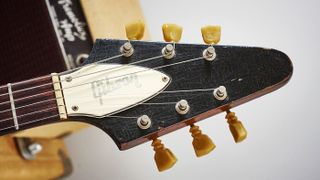Gibson has won a decisive victory over Dean in its trademark infringement case over trademark infringement of its electric and acoustic guitars.
"The court’s decision by jury today, to uphold Gibson’s long-established and well-recognised trademarks for Gibson’s innovative and iconic guitar shapes is a win for Gibson and the music community at large," says Gibson in a statement.
"The court found that the Gibson Trademarks are valid, the Gibson shapes are not generic, and the defendants were guilty of both infringement and counterfeiting. Gibson is very pleased with the outcome after years of simply trying to protect their brand and business through well recognised intellectual property rights, rights that have been Gibson’s for decades."
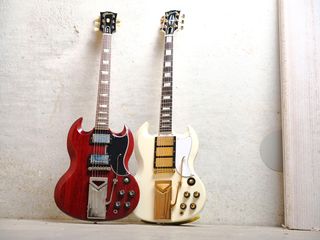
In a positive spin on the judgement, Dean Guitars are focussing on trademark infringement of three of its guitar models that weren't found in Gibson's favour. And notably Dean was not found to have infringed on Gibson’s standalone trademark for the Flying V electric guitar.
“We are thrilled that a Texas jury has vindicated Armadillo in ruling for Armadillo on its defense to Gibson’s trademark claims on our Dean V guitar, Dean Z guitar, and Evo headstock," says Dean's parent company Armadillo CEO Evan Rubinson in a statement. The jury found that Armadillo is not liable to Gibson for our long use of those guitars and headstock.
"The jury issued a judgment in the amount of $4000, a mere fraction of the $7 million plus originally sought by Gibson," added Rubinson.
That $4,000 relates to what Gibson is deemed to be owed for “counterfeiting statutory damages per counterfeit trademark per type of goods sold, [or] offered for sale.”
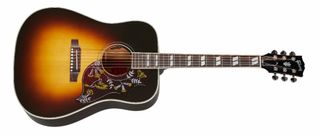
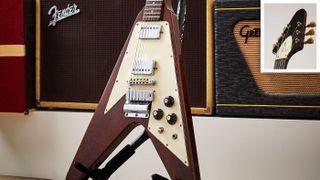
The jury also found the Dean marketed counterfeits of the Explorer, Flying V, SG body shapes, as well as the Gibson Hummingbird. It is not guilty of marketing a counterfeit of the Dove Wing headstock shape.
The 27 May rulings in Gibson's favour come at the end of a two-week trial concern the US trademarks for the Flying V body shape, the Explorer body shape, the ES body shape, and the SG body shape. Gibsons retains the trademark for these in the US.
Following the admissions of hundreds of pieces of evidence and a number of industry witnesses taking the stand, a jury found that Dean had infringed on Gibson’s trademarks for guitar body shapes concerning the Flying V, Explorer and SG models.
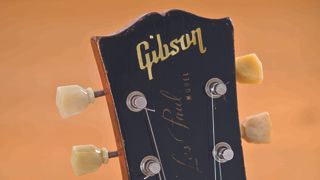
From a broader perspective, this court decision is also a win for Gibson Fans, Artists, Dealers, and related Partners who expect and deserve authenticity
Gibson
In addition it ruled in Gibson's favour on trademarks for the Dove Wing headstock and the hummingbird acoustic guitar.
”Gibson’s guitar shapes are iconic, and now are firmly protected for the past, present, and future," Gibson concluded in its statement following the rulings. "From a broader perspective, this court decision is also a win for Gibson Fans, Artists, Dealers, and related Partners who expect and deserve authenticity. Not to mention for all of the iconic American brands that have invested in meaningful innovation and continued protection, only to see it diluted with unauthorised and often illegitimate knockoffs.
"Gibson can now focus attention on continuing to leverage its iconic past, and invest in future innovation, with confidence."
This case is in contrast to Europe where Gibson had a Flying V trademark appeal rejected by the EU General Court in 2019.
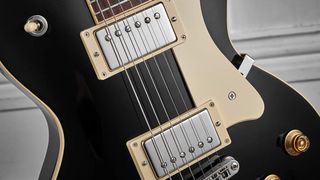
The legal focus for Gibson now switches to the BandLab-owned Heritage Guitars' legal action against Gibson, in response to threats issued by the US company over alleged trademark infringement.
Heritage's history as a brand dates back to Kalamazoo in the 1980s. Following Gibson’s factory move from Michigan to Nashville in 1984, Heritage Guitars was formed in Kalamazoo, Michigan by a small group of former Gibson employees. The firm then continued to make Gibson-style guitars.
Relations between the two company's appeared to sour after the 2016 acquisition in part by BandLab Technologies, a Singapore-based conglomerate run by Meng Ru Kuok, the son of billionaire palm-oil trader Kuok Khoon Hong.
“To be clear, Gibson has not sued Heritage and has been proactive towards a solution,” Gibson said in a statement in 2020.
“However, Gibson will not accept that Heritage Guitars, [part-]owned by BandLab, in partnership with real estate developers, can re-write Gibson’s history or blatantly breach a good faith contract.”
We'll bring you updates on that ongoing case as they develop.
